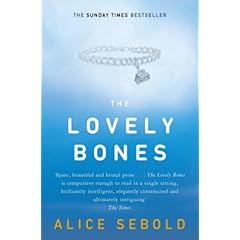 Contrary to popular opinion, I thought this book just wasn't all that. I know many people who have this book on their "best of" lists, and it's supposed to be amazing. And there are parts of it which are... specially the premise:
Henry suffers from a genetic disorder, which allows him to time-travel, albeit the time-traveling isn't done at his will, but can happen anytime, with no heads up whatsoever. So, at the age of thirty-six, he goes back in time to meet Clare. the love of his life, who is six, but, in real terms, she is only eight years younger than him!
Contrary to popular opinion, I thought this book just wasn't all that. I know many people who have this book on their "best of" lists, and it's supposed to be amazing. And there are parts of it which are... specially the premise:
Henry suffers from a genetic disorder, which allows him to time-travel, albeit the time-traveling isn't done at his will, but can happen anytime, with no heads up whatsoever. So, at the age of thirty-six, he goes back in time to meet Clare. the love of his life, who is six, but, in real terms, she is only eight years younger than him!
So, as I was saying, the premise in itself is interesting, and gripping. However, this book has disregarded the concept of space-time continuum completely - almost as though such a thing didn't exist, and time-traveling decided the course of events, as opposed to nature, fate, or life itself.
For example, Henry tells little Clare that he is her future husband. So, all her life, Clare is only seeking one man, as she doesn't see any point in dating other guys, for she already knows who she's going to end up with. So, if Henry hadn't gone back in time to tell Clare about their love, would Clare have even given him a second look when she met him in the library?
And, why would someone tell his future wife that they'll be together when she's a small easily impressionable child? Shouldn't some things just be left to chance? Personally speaking, I would have hated it if someone would have told me that in my pre-adolescent and adolescent days, for, it probably would've ended up trivializing a lot.
Second, I really didn't understand what the whole deal with shedding clothes and arriving naked in the non-real time zone was about? Was Henry moving so fast that the clothes didn't have a chance to keep up with him? Was that really that necessary a part of the book? Because, at times, there were some semi-pedophiliac moments.
And, how could Henry have told the number of people he told his 'secret', and not have it turn into a gigantic deal with the media? How did he manage to escape becoming a part of a scientific experiment? Gomez hated him. Dr. Kendrick would have had his own interests at heart, and a case like Henry's would have ensured him some well-deserved limelight.
I know, it's supposed to be a romantic sci-fi book, but the sci-fi bit isn't really, as it's too romanticized, and the romance is just dull. I couldn't relate to either of the protagonists (Clare or Henry), and I just couldn't fathom what made them tick. I know I'm in the minority here, but, this book just wasn't for me. Add to it that there are two narrators, and the book is constantly going back and forth in time, with some repetitions, and that's enough to confuse the living daylights out of me. In fact, I thought that the editors should've stripped at least 200 pages from the book.
Maybe I just didn't get the book, or maybe, I was expecting too much, or, maybe I was reading the book in a pragmatic frame of mind. I don't know. I know some of you loved this book, so I'd be interested to hear what made the book tick for you? And what made it really phenomenal, because as things stand, I honestly think I missed out on something fundamental, which is what ruined the experience for me.
Rating: 1
 I'm still playing catch-up on 13th June's
I'm still playing catch-up on 13th June's  This is a well-written page turner, with all the elements of a good story: romance, history, friendship, murder, revenge, redemption, bad cop, good beggar, a young impressionable protagonist, and a history that seems to be re-living itself, with different actors...
This is a well-written page turner, with all the elements of a good story: romance, history, friendship, murder, revenge, redemption, bad cop, good beggar, a young impressionable protagonist, and a history that seems to be re-living itself, with different actors...  This is Sebold’s debut novel, and while there’s lots of loopholes in the story, the premise in itself is interesting.
This is Sebold’s debut novel, and while there’s lots of loopholes in the story, the premise in itself is interesting.